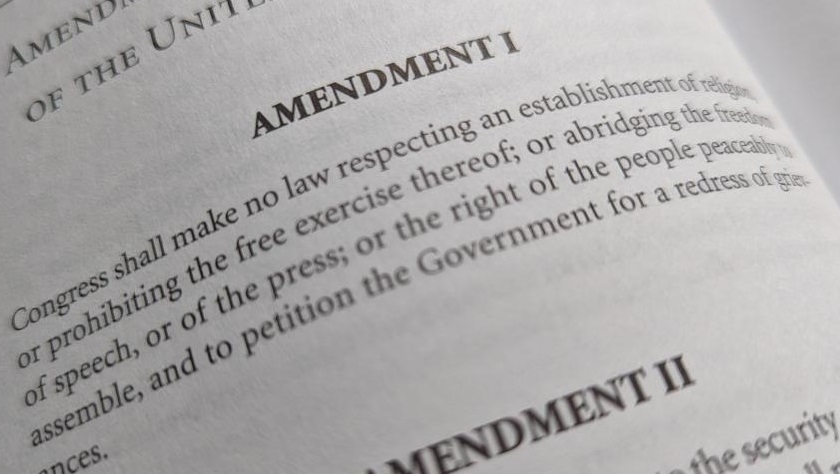There is an idea that many people — but especially constitutional law students, who then go on to be public officials — have not been exposed to, which is that there is a proper order to the questions that should be asked when formulating public policy.
Normally those are the standard journalism questions: Who, what, where and when, why, and how?
But that list doesn’t contain the most important question of all, the one that always needs to be asked first: Whether?
That is, the idea of a constitution is to recognize that certain kinds of solutions to certain kinds of problems should simply never be considered. They should be taken off the table before the discussion of how to solve a problem even begins.
Sometimes that’s a question of rights: Whatever you do, you can’t make people shut up or leave them defenseless. Sometimes it’s a question of structure: One branch of government can’t abdicate its responsibilities to another branch or usurp the power of another branch.
When you ignore that initial question — whether you have the power to do what you’re contemplating — you place the public in a peculiar position. They see that the Constitution forbids certain kinds of laws but also see that such laws are in effect.
How does this happen? There are lots of reasons, but the most basic one is that courts have given themselves the power to ignore the simple meanings of words like all and not and even and. This, in fact, makes it impossible to write a law that simply means what it says and that a citizen can understand simply by reading it.
For example, suppose the people decide to express, as a constitutional guarantee, the idea that anyone should be able to say absolutely anything without fear of punishment. They might say something like Congress, and the states, shall pass no laws abridging freedom of speech.
The First and Fourteenth Amendments already say exactly this. Clearly, it hasn’t been effective.
Here’s how Justice Hugo Black would have phrased it: Without deviation, without exception, without any ifs, buts, or wherases, the government shall not do something to people either for the views they have or the views they express or the words they speak or write.
But does anyone seriously believe that the courts wouldn’t find a way to ‘interpret’ this to mean whatever they want?
Contrast Black’s view with the view expressed by Chief Justice Charles Evans Hughes: We are under a Constitution, but the Constitution is what the judges say it is.
That is, the courts have taken what used to be a comical passage in children’s literature,
“When I use a word,” Humpty Dumpty said, in rather a scornful tone, “it means just what I choose it to mean—neither more nor less.”
and turned it in to a fundamental principle of jurisprudence.
Legislatures, emboldened by the approach of the courts, take advantage of it to treat the constitutional limits placed upon them as mere suggestions to the courts. Their approach becomes: Let’s pass whatever laws we want, and if the court doesn’t like them, it will strike them down, or just rewrite them.
This changes the very idea of public policy in a fundamental way. What starts out as the idea that law is a way to organize society with the consent of those being organized, ends up as the idea that law is a way for whatever group happens to be in control of the machinery of government to impose its own preferences on everyone else.
And that means the policy of the public with respect to the law is to see law, not as something to be obeyed because it’s just, but as something to be ignored whenever possible because it’s unjust.
That the law is something to work around — an obstacle, instead of a guide — is normally the attitude that we associate with outlaws. The current approach to the regulation of things like guns, speech, education, gambling, recreational drug use, and so on has effectively turned everyone into an outlaw.
That is, by focusing on redefining words instead of rewriting sentences, both the federal and the state governments have undermined respect, not just for laws about guns, speech, drugs, and so on, but for all laws. For the very idea of law.
With respect to the 2nd Amendment in particular, this shift in public opinion regarding the law highlights the wisdom of forbidding government from ever having a monopoly on force.
The only position that allows the law to command the respect that it deserves is: If you want to regulate something, amend the Constitution to delegate that power to Congress, and then we can talk. Until then, any policy that infringes on the right to keep and bear arms should be off the table; and by placing it on the table anyway, you are destroying respect for the law, and ironically demonstrating why gun control laws, even if passed, should be ignored.
It’s easy to be distracted by discussions of things like statistics, public safety, and so on. Government officials who want to abridge rights spend a lot of time and effort pointing at individual trees. It’s the job of the people to keep looking at the forest by always coming back to the fundamental question of whether the government has been delegated the authority to carry out whatever proposal it’s considering.
And when considering that question, it’s a good idea to remember this important point: You can’t delegate a power that you don’t have. If you couldn’t do something yourself, or hire someone to do it, you can’t elect someone to do it, either.
So we’ve reached the point where it’s up to the outlaws to rein in the lawmakers. How ironic is that?
